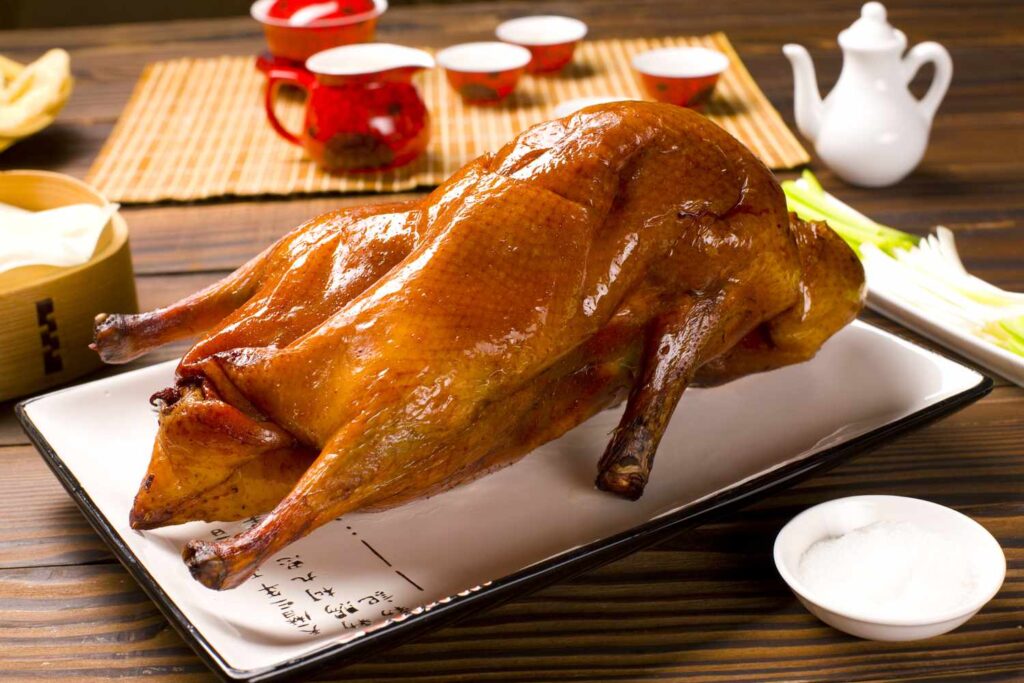
Your teeth sink into that crisped-up, lacquered skin—still glistening like it was brushed with royalty itself—and for a moment, the world shuts the hell up.
You’re not in a restaurant anymore. You’re in a marble hall, silk robe dragging behind you, surrounded by gold dragons and whispers of power.
That duck doesn’t just crunch; it proclaims. It’s not food. It’s a full-blown coronation in your mouth.
We’re not talking about just another Chinese dish dressed up for Instagram. Peking Duck walks in like it owns the room, smirking at your truffle fries and caviar dreams.
This bird’s been glorified since emperors walked the Earth in jade slippers.
When something’s been rolling deep with dynasties since the Yuan era, you know it ain’t just about taste—it’s about flex. Quiet, dignified, thousand-year-old kind of flex. The kind that doesn’t shout wealth but whispers, “I was born to be indulged.”
It’s precision. It’s ritual. It’s legacy folded into pancakes.
You don’t just cook Peking Duck—you train for it. Skin separated from flesh with a bike-pump-looking gadget, hung like medieval art, air-dried, brushed obsessively with maltose until it glows like the Holy Grail.
Then roasted to hell and back in a brick oven, because shortcuts don’t belong in this narrative. This ain’t air fryer material. The chef? Probably has PTSD from duck school.
And when it lands on your table? Razor-thin slices laid out like silk scrolls. That glassy skin snapping under your molars while the meat underneath melts like it’s got nothing left to prove.
A smear of hoisin. A sliver of cucumber. A whisper of scallion. Wrapped in a paper-thin pancake that barely holds it together—just like you, trying not to weep at how stupidly good it is.
Let’s get one thing clear: this duck didn’t come to play cute fusion games. It didn’t get lost on a tapas menu or reinvented with quinoa. It knows what it is.
And it’s been that way since the Ming emperors were out here having duck for breakfast while building literal palaces. They knew what was up. This was the power meal before power meals were even a concept.
Peking Duck is not humble. It’s not trying to relate. It’s the kind of dish that flicks foie gras off the table and pours itself some baijiu.
You walk out of that meal feeling like you committed sin and sealed a business deal at the same damn time. Because that’s what it does—it gives you gravitas. Elevates your energy. Makes you forget you still have rent due.
And the thing is, it’s all about control. Every slice is surgical. Every bite balanced. It’s the opposite of messy indulgence. It’s grace under pressure, elegance in heat.
A damn thesis on restraint. If the food world were a court, Peking Duck would be the silent general—no need to raise its voice. The aroma alone would have people kneeling.
So next time someone talks about luxury dining and they drop the usual suspects—wagyu this, otoro that—just smile. You know the truth. You know there’s a dish that’s been ruling the scene long before hashtags were invented. A dish that doesn’t ask for attention but commands it.
“Elegance is refusal,” Diana Vreeland once said. But if she had tasted Peking Duck, she might’ve added, “Unless it’s duck—then elegance is devouring it unapologetically.”
Because one bite is all it takes. And suddenly, you’re not eating dinner.
You’re sitting on a throne.









